- Home
- Eoin Colfer
The Opal Deception (Disney) Page 11
The Opal Deception (Disney) Read online
Page 11
Opal almost purred. “That’s right. It’s always about me. I am the only important one here.”
Artemis casually slipped one hand into his pocket. The one holding the cell phone that was still connected to Fowl Manor.
“If I may, Miss Koboi. This delusion of self-importance is common among those recently awakened from comas. It is known as the Narcissus Syndrome. I wrote a paper on this precise subject for the Psychologists Yearbook, under the pseudonym Sir E. Brum. You have spent so much time in your own company, so to speak, that everyone else has become unreal.…”
Opal nodded at Merv. “For heaven’s sake, shut him up.”
Merv was glad to oblige, sinking a blue power slug into Artemis’s chest. The Irish boy dropped in midlecture.
“What have you done?” shouted Holly, dropping to Artemis’s side. She was relieved to find a steady heartbeat under the bloodied shirt.
“Oh no,” said Opal. “Not dead, merely painfully stunned. He is having quite a day, young Artemis.”
Holly’s pretty features were distorted by grief and outrage as she glared at the small pixie. “What do you want from us? What else can you do?”
Opal’s face was the picture of innocence. “Don’t blame me. You have brought this on yourself. All I wanted to do was bring down fairy society as we know it, but oh no, you wouldn’t have it. Then I planned a couple of relatively simple assassinations, but you insisted on surviving. Kudos to you for evading the bio-bomb, by the way. I was watching the whole thing from sixty-five feet up in my stealth shuttle. Containing the solinium with an LEP helmet. Good thinking. But now, because you have caused me so much trouble and exasperation, I think I will indulge myself a little.”
Holly swallowed the fear that was crawling up her throat. “Indulge yourself?”
“Oh yes. I had a nasty little scenario planned for Foaly—something theatrical involving the Eleven Wonders. But now I have decided that you are worthy of it.”
Holly tensed herself. She should go for her gun, there was no other option. But she had to ask; it was fairy nature: “How nasty?”
Opal smiled, and evil was the only word for that expression. “Troll nasty,” she said. “And one more thing. I am telling you this because you are about to die, and I want you to hate me at the moment of your death as much as I hate you.” Opal paused, allowing the tension to build. “Do you remember the sweet spot on the bomb I strapped to Julius?”
Holly felt as though her heart had expanded to fill her entire chest. “I remember.”
Opal’s eyes flared. “Well, there wasn’t one.”
Holly went for her gun, and Merv hit her in the chest with a blue charge. She was asleep before she hit the ground.
Under the Atlantic Ocean, Two Miles off the Kerry Coast, Irish Waters
Ten thousand feet below the surface of the Atlantic, an LEP subshuttle was speeding through a minor volcanic trench toward the mouth of a subterranean river. The river led to an LEP shuttleport where the subshuttle’s passengers could transfer to a regular craft.
The craft had three passengers and a pilot. The passengers were a dwarf felon and the two Atlantis marshals who were transporting him. Mulch Diggums, the felon in question, was in high spirits for someone in prison clothes. The reason being that his appeal had finally come through, and his lawyer was optimistic that all charges against his client were about to be quashed on a technicality.
Mulch Diggums was a tunnel dwarf who had abandoned the mines in favor of a life of crime. He removed items of value from Mud People’s houses and sold them on the black market. In the past few years his destiny had become intertwined with those of Artemis Fowl and Holly Short, and he had played a key part in their adventures. Inevitably this roller-coaster lifestyle had come crashing down around him as the long arm of the LEP closed in. Before he had been led away to serve the remainder of his sentence, Mulch Diggums was permitted to say good-bye to his human friend.
Artemis had given him two things: One was a note advising him to check the dates on the original search warrant for his cave. The other was a gold medallion to be returned to Artemis in two years. Apparently Artemis wished to resurrect their partnership at that time. Mulch had studied the medallion a thousand times, searching for its secrets, until his constant rubbing wore down the gold plating to reveal a computer disk beneath. Obviously Artemis had recorded a message to himself. A way to return the memories that the LEP had taken from him.
As soon as he had been transported to the Deeps Maximum Security Prison outside Atlantis, Mulch had put in a request for a counsel call. When his state-appointed attorney had grudgingly turned up, Mulch advised him to check the dates on the search warrant leading to his original arrest. Somehow, amazingly, the dates were wrong. According to the LEP computer, Julius Root had searched his cave before obtaining a search warrant. The warrant nullified this and all later arrests. All that remained was a lengthy processing period and one last interview with the arresting officer, and Mulch would be a free dwarf.
Finally, the day had come. Mulch was being shuttled to Police Plaza for his meeting with Julius Root. Fairy law allowed Root one thirty-minute interview to squeeze some kind of confession from Mulch. All the dwarf had to do was stay quiet, and he would be eating vole curry in his favorite dwarf chophouse by dinnertime.
Mulch closed his fist around the medallion. He had no doubt who was pulling the strings here. Somehow, Artemis had hacked the LEP computer and changed his records. The Mud Boy was setting him free.
One of the marshals, a slight elf with Atlantean gills, sucked a slobbery breath through his neck, letting it out through his mouth.
“Hey, Mulch,” he wheezed. “What are you going to do when your appeal is turned down? Are you gonna crack up like a little girl? Or are you gonna take it real stoic, like a dwarf should?”
Mulch smiled, exposing his unfeasibly large number of teeth. “Don’t worry about me, fishboy. I’ll be eating one of your cousins by tonight.”
Generally the sight of Mulch’s tombstone teeth was enough to freeze any smart-aleck comments, but the Marshal was not used to back talk from an inmate.
“Keep at it with the big mouth, dwarf. I have plenty of rocks for you to chew back in the Deeps.”
“In your dreams, fishboy,” retorted Mulch, enjoying the banter after months of kowtowing.
The officer rose to his feet. “It’s Vishby, the name is Vishby.”
“Yes, fishboy, that’s what I said.”
The second officer, a water sprite with batlike wings folded behind his back, chuckled. “Leave him alone, Vishby. Don’t you know who you’re talking to? This here is Mulch Diggums. The most famous thief under the world.”
Mulch smiled, though fame is not a good thing when you’re a thief.
“This guy has a whole list of genius moves to his credit.”
Mulch’s smile faded as he realized that he was about to be the butt of more jokes.
“Yeah, so, first he steals the Jules Rimet trophy from the humans and tries to sell it to an undercover LEP fairy.”
Vishby sat rubbing his hands in glee. “You don’t say? What a brain! How does it fit in that itty-bitty head?”
The sprite strutted along the shuttle’s aisle, delivering his lines like an actor. “So then he lifts some of the Artemis Fowl gold, and lays low in Los Angeles. And do you want to know how he lays low?”
Mulch groaned.
“Tell me,” wheezed Vishby, his gills unable to suck in air fast enough.
“He buys hisself a penthouse apartment and starts building a collection of stolen Academy Awards.”
Vishby laughed until his gills flapped.
Mulch could take it no longer. He shouldn’t have to put up with this; he was virtually a free fairy, for goodness’ sake. “Hisself? Hisself? I think you’ve spent a bit too long under water. The pressure is squashing your brain.”
“My brain is squashed?” said the sprite. “I’m not the one who spent a couple of centuries in prison. I’m
not the one wearing manacles and a mouth ring.”
It was true. Mulch’s criminal career had not exactly been an unqualified success. He had been caught more than he’d escaped. The LEP was just too technologically advanced to evade. Maybe it was time to go straight, while he still had his looks.
Mulch shook the chains that shackled him to a rail in the holding area. “I won’t be wearing these for long.”
Vishby opened his mouth to respond, then paused. A plasma screen was flashing red on a wall panel. Red was urgent. There was an important message coming through. Vishby hooked an earphone over his ear and turned the screen away from Mulch. As the message was delivered, his face lost every trace of levity. Several moments later, he tossed the headphones on the console.
“It looks like you’ll be wearing those chains for a bit longer than you thought.”
Mulch’s jaw strained against the steel mouth ring. “Why? What’s happened?”
Vishby scratched a strip of gill rot on his neck. “I shouldn’t tell you this, convict, but Commander Root has been murdered.”
Mulch couldn’t have been more shocked if they had connected him to the underworld grid.
“Murdered? How?”
“Explosion,” said Vishby. “Another LEP officer is the prime suspect. Captain Holly Short. She’s missing, presumed dead on the surface, but that hasn’t been confirmed.”
“I’m not a bit surprised,” said the water sprite. “Females are too temperamental for police work. They couldn’t even handle a simple transport job like this.”
Mulch was in shock. He felt as though his brain had snapped its moorings and was spinning in his head. Holly murdered Julius? How could that be possible? It wasn’t possible, simple as that. There must be a mistake. And now Holly was missing, presumed dead. How could this be happening?
“Anyways,” continued Vishby. “We gotta turn this crate around and head back to Atlantis. Obviously your little hearing is being postponed indefinitely, until this entire mess gets sorted out.”
The water sprite slapped Mulch playfully on the cheek. “Tough break, dwarf. Maybe they’ll get the red tape untangled in a couple of years.”
Mulch barely felt the slap, though the words penetrated. A couple of years. Could he take a couple of years in the Deeps? Already his soul cried out for the tunnels. He needed to feel soft earth between his fingers. His insides needed real roughage to clear them out. And of course, there was a chance that Holly was still alive and needed help. A friend. He had no option but to escape.
Julius dead. It couldn’t be true.
Mulch mentally leafed through his dwarf abilities to select the best tool for this escape. He had long since forfeited his magic by breaking most of the Fairy Book’s commandments, but dwarfs had extraordinary gifts granted them by evolution. Some of these were common knowledge among the People, but dwarfs were a notoriously secretive race who believed that their survival depended on concealing these talents. It was well known that dwarfs excavated tunnels by ingesting the earth through their unhinged jaws, then ejecting the recycled dirt and air through the other end. Most fairies were aware that dwarfs could drink through their pores, and if they stopped drinking for a while, then these pores were transformed into minisuction cups. Fewer People knew that dwarf spit was luminous, and hardened when layered. And no one knew that a by-product of dwarf flatulence was a methane-producing bacterium called Methanobrevibacter smithii, which prevented decompression sickness in deep-sea divers. In fairness, dwarfs didn’t know this either; all they knew was that on the rare occasion they found themselves accidentally burrowing into the open sea, the bends did not seem to affect them.
Mulch thought about it for a moment and realized that there was a way to combine all of his talents and get out of here. He had to put his on-the-hoof plan into effect immediately, before they went into the deep Atlantic trenches. Once the subshuttle went too deep, he would never make it.
The craft swung in a long arc until it was heading back the way it had come. The pilot would punch the engines as soon as they were outside Irish fishing waters. Mulch began to lick his palms, smoothing the spittle through his halo of wild hair.
Vishby laughed. “What are you doing, Diggums? Cleaning up for your cell mate?”
Mulch would have dearly loved to unhinge his jaw and take a bite out of Vishby, but the mouth ring prevented him from opening his mouth far enough to unhinge. He had to content himself with an insult.
“I may be a prisoner, fishboy, but in ten years I’ll be free. You, on the other hand, will be an ugly bottom-feeder for the rest of your life.”
Vishby scratched his gill rot furiously. “You just bought yourself six weeks in solitary, mister.”
Mulch slathered his fingers with spittle and spread it around the crown of his head, reaching as far back as the manacles would allow. He could feel his hair hardening, clamping onto his head like a helmet. Exactly like a helmet. As he licked, Mulch drew great breaths of air through his nose, storing the air in his intestines. Each breath sucked air out of the pressurized space faster than the pumps could push it back in.
The marshals did not notice this unusual behavior, and even if they had, the pair would doubtless have put it down to nerves. Deep breathing and grooming. Classic nervous traits. Who could blame Mulch for being nervous; after all, he was heading back to the very place criminals had nightmares about.
Mulch licked and breathed, his chest blowing up like a bellows. He felt the pressure fluttering down below, anxious to be released.
Hold on, he told himself. You will need every bubble of that air.
The shell on his head crackled audibly now, and if the lights had been dimmed, it would have glowed brightly. The air was growing thin, and Vishby’s gills noticed, even if he didn’t. They rippled and flapped, boosting their oxygen intake. Mulch sucked again, a huge gulp of air. A bow plate clanged as the pressure grew.
The sea sprite noticed the change first. “Hey, fishboy.”
Vishby’s pained expression spoke of years enduring this nickname. “How many times do I have to tell you?”
“Okay, Vishby, keep your scales on. Is it getting hard to breathe in here? I can’t keep my wings up.”
Vishby touched his gills; they were flapping like bunting in the wind. “Wow. My gills are going crazy. What’s happening here?” He pressed the cabin intercom panel. “Everything all right? Maybe we could boost the air pumps.”
The voice that came back was calm and professional, but with an unmistakably anxious undertone. “We’re losing pressure in the holding area. I’m trying to nail down the leak now.”
“Leak?” squeaked Vishby. “If we depressurize at this depth, the shuttle will crumple like a paper cup.”
Mulch took another huge breath.
“Get everyone into the cockpit,” the voice declared. “Come through the air lock, right now.”
“I don’t know,” said Vishby. “We’re not supposed to untie the prisoner. He’s a slippery one.”
The slippery one took another breath. And this time a stern plate actually buckled with a crack like thunder.
“Okay, okay. We’re coming.”
Mulch held out his hands. “Hurry up, fishboy. We don’t all have gills.”
Vishby swiped his security card along the magnetic strip on Mulch’s manacles. The manacles popped open. Mulch was free. As free as you can be in a prison sub with ten thousand crushing feet of water overhead. He stood, taking one last gulp of air.
Vishby noticed the act. “Hey, convict, what are you doing?” he asked. “Are you sucking in all the air?”
Mulch burped. “Who, me? That’s ridiculous.”
The sprite was equally suspicious. “He’s up to something. Look, his hair is all shiny. I bet this is one of those secret dwarf arts.”
Mulch tried to look skeptical. “What? Air-sucking and shiny hair? I’m not surprised we kept it a secret.”
Vishby squinted at him. His eyes were red rimmed, and his speech was slurre
d from oxygen deprivation. “You’re up to something. Put out your hands.”
Being shackled again was not part of the plan. Mulch feigned weakness. “I can’t breathe,” he said, leaning against the wall. “I hope I don’t die in your custody.”
This statement caused enough distraction for Mulch to heave one more mighty breath. The stern plate creased inwardly and a silver stress line cracked through the paint. Red pressure lights flared on all over the compartment.
The pilot’s voice blared through the speaker. “Get in here!” he shouted, all traces of composure gone. “She’s gonna fold.”
Vishby grabbed Mulch by the lapels. “What did you do, dwarf?”
Mulch sank to his knees, flicking open the bum-flap at the rear of his prison overalls. He gathered his legs beneath him, ready to move.
“Listen, Vishby,” he said. “You’re a moron, but not a bad guy, so do like the pilot says and get in there.”
Vishby’s gills flapped weakly, searching for air. “You’ll be killed, Diggums.”
Mulch winked at him. “I’ve been dead before.”
Mulch could hold on to the gas no longer. His digestive tract was stretched like a magician’s balloon animal. He folded his arms across his chest, aimed the coated tip of his head at the weakened plate, and let the gas loose.
The resultant emission shook the subshuttle to its very rivets, sending Mulch rocketing across the hold. He slammed into the stern plate, smack in the center of the fault line, punching straight through. His speed popped him through into the ocean perhaps half a second before the sudden change in pressure flooded the sub’s chamber. Half a second later, the rear chamber was crushed like a ball of used tinfoil. Vishby and his partner had escaped to the pilot’s cockpit just in time.
Mulch sped toward the surface, a stream of released gas bubbles clipping him along at a rate of several knots. His dwarf lungs fed on the trapped air in his digestive tract, and the luminous helmet of spittle sent out a corona of greenish light to illuminate his way.
Of course they came after him. Vishby and the water sprite were both amphibious Atlantean dwellers. As soon as they jettisoned the wreckage of the rear compartment, the marshals cleared the air lock, finning after their fugitive. But they never had a prayer: Mulch was gas powered, they merely had wings and fins. Whatever pursuit equipment they’d had was at the bottom of the ocean, along with the rear compartment, and the cockpit’s backup engines could barely outrun a crab.

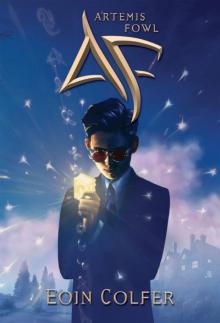 Artemis Fowl
Artemis Fowl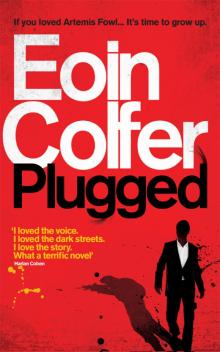 Plugged
Plugged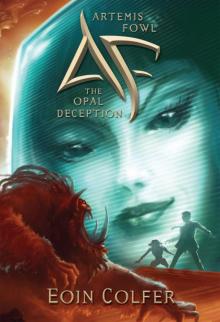 The Opal Deception
The Opal Deception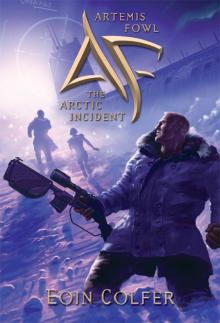 The Arctic Incident
The Arctic Incident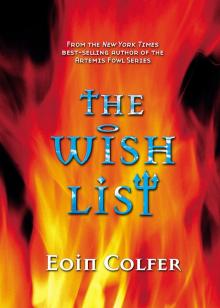 The Wish List
The Wish List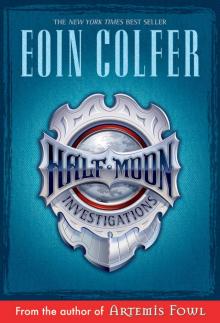 Novel - Half Moon Investigations
Novel - Half Moon Investigations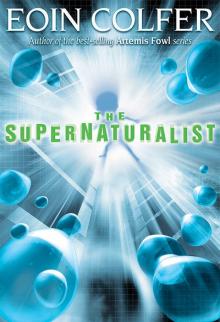 The Supernaturalist
The Supernaturalist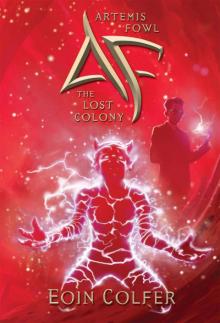 The Lost Colony
The Lost Colony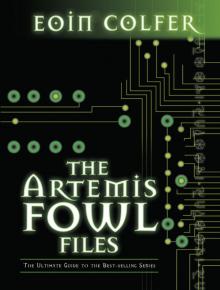 The Artemis Fowl Files
The Artemis Fowl Files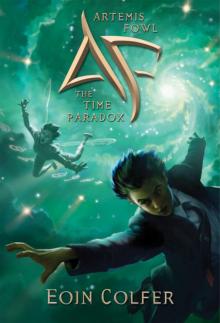 The Time Paradox
The Time Paradox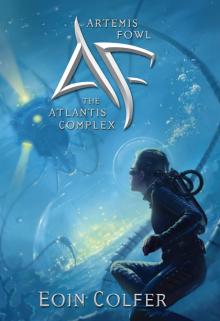 The Atlantis Complex
The Atlantis Complex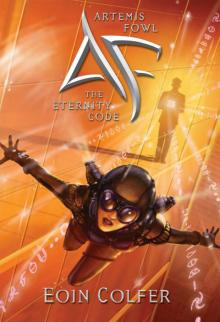 The Eternity Code
The Eternity Code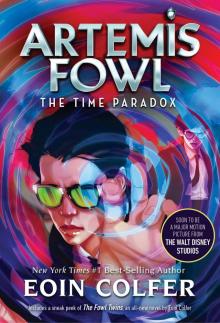 The Time Paradox (Disney)
The Time Paradox (Disney)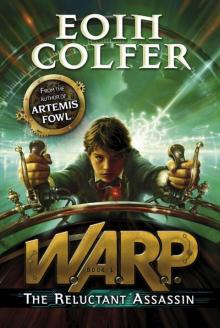 The Reluctant Assassin
The Reluctant Assassin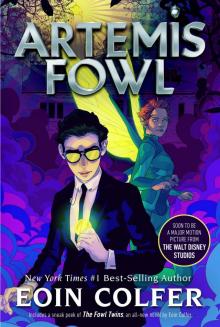 Artemis Fowl (Disney)
Artemis Fowl (Disney) Highfire
Highfire The Last Guardian
The Last Guardian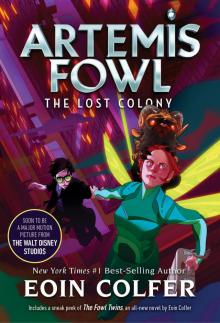 The Lost Colony (Disney)
The Lost Colony (Disney) Screwed: A Novel
Screwed: A Novel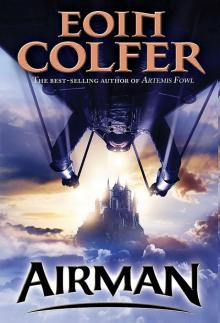 Novel - Airman
Novel - Airman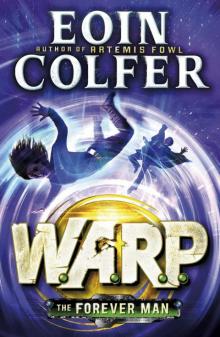 The Forever Man
The Forever Man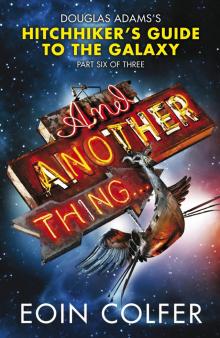 And Another Thing...
And Another Thing...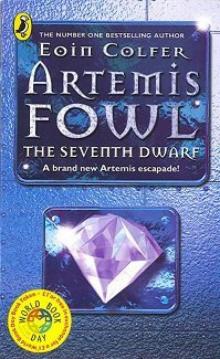 The Seventh Dwarf
The Seventh Dwarf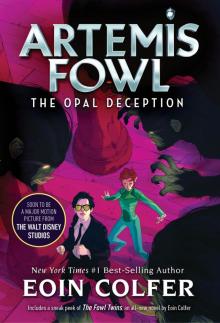 The Opal Deception (Disney)
The Opal Deception (Disney)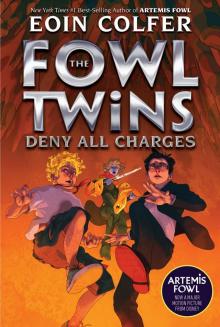 The Fowl Twins Deny All Charges
The Fowl Twins Deny All Charges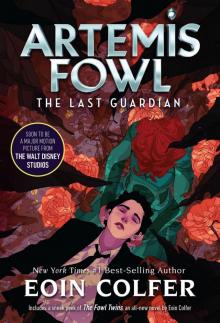 The Last Guardian (Disney)
The Last Guardian (Disney)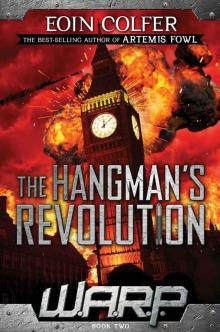 The Hangman's Revolution
The Hangman's Revolution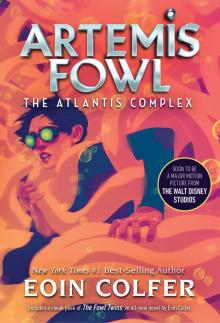 The Atlantis Complex (Disney)
The Atlantis Complex (Disney)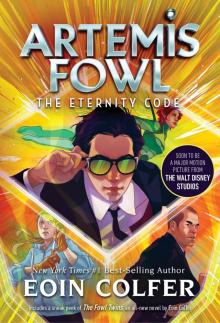 The Eternity Code (Disney)
The Eternity Code (Disney)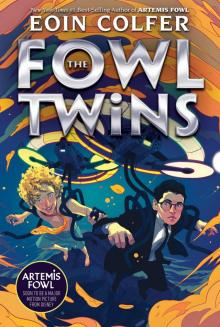 The Fowl Twins
The Fowl Twins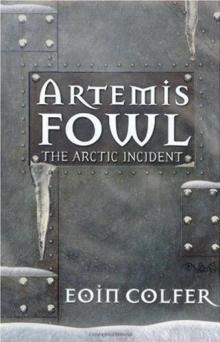 Artemis Fowl. The Arctic Incident af-2
Artemis Fowl. The Arctic Incident af-2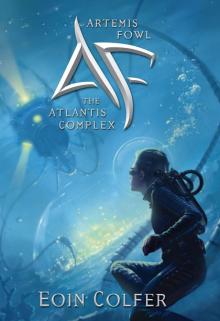 Artemis Fowl and the Atlantis Complex af-7
Artemis Fowl and the Atlantis Complex af-7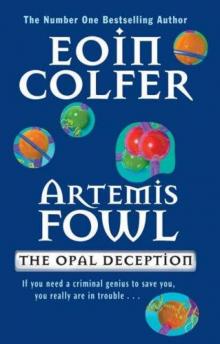 Artemis Fowl. The Opal Deception af-4
Artemis Fowl. The Opal Deception af-4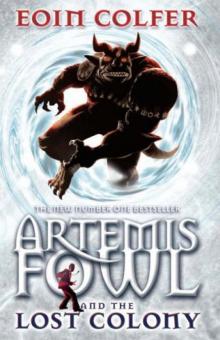 Artemis Fowl. The Lost Colony af-5
Artemis Fowl. The Lost Colony af-5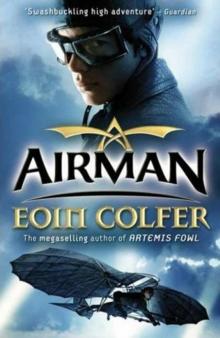 Airman
Airman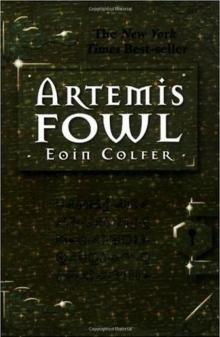 Artemis Fowl af-1
Artemis Fowl af-1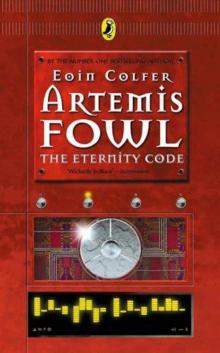 Artemis Fowl: The Eternity Code af-3
Artemis Fowl: The Eternity Code af-3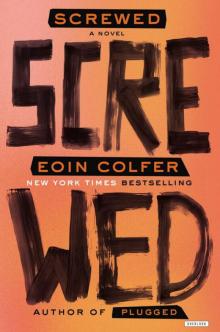 Screwed dm-2
Screwed dm-2